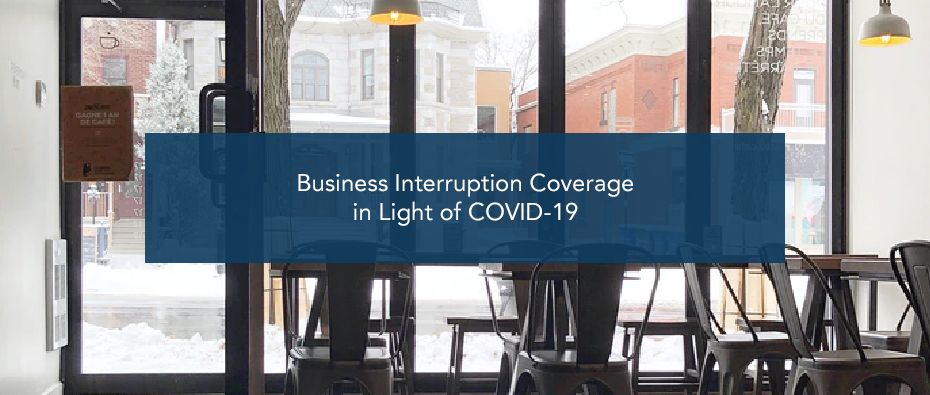Business Interruption Coverage in Light of COVID-19
As COVID-19 continues to wreak havoc on the lives of the world’s population, substantial insurance issues have arisen in its wake. Most of these issues relate to whether commercial property insurance policies and/or other policies which include coverage for business interruption, extra income, and acts of civil authority cover losses as a result of the forced shutdown of U.S. businesses.
At their heart, policies of insurance are nothing more than contracts. We have already seen countless actions filed and anticipate there will be a flood of challenges from both a declaratory judgment and breach of contract perspective for any denials based upon:
- the pandemic event exclusions that have been quietly inserted over the last several years after the SARS-CoV virus, as well as;
- the general business interruption clause requiring the existence of direct physical loss to a business location.
While a strong argument exists that a virus that affects individuals is not a direct physical loss to a business, the virus itself has been studied and proven to survive on surfaces for a prolonged period of time. These arguments underpin the various state and federal actions filed throughout the U.S.
Notable Insurance Coverage Actions
Some of the more notable coverage actions relating to COVID-19 include:
- El Novillo Restaurant et al. v. Certain Underwriters at Lloyd’s London et al. (Florida). Filed as a class action by multiple south Florida restaurants and similarity situated parties and relying upon the civil authority provision of the commercial property policies at issue.
- Cajun Conti, LLC, et al. v. Certain Underwriters at Lloyd’s et al. (Louisiana). Filed by a chain of New Orleans restaurants. Plaintiffs argue that contamination of the insured premises by COVID-19 would be a direct physical loss, which would trigger coverage under the relevant policy.
- SCGM, Inc. et al. v. Certain Underwriters at Lloyd’s (Texas). Filed by a movie theater chain. The endorsement at issue (purportedly created after the Ebola Pandemic in or around 2014), allegedly covers business losses resulting from a “Pandemic Event.” Plaintiff alleges that the policy in question defines “Pandemic Event” to mean “the announcement by a Public Health Authority that a specific Covered Location is being closed as a result of an Epidemic declared by the [Centers for Disease Control and Prevention] or [World Health Organization].” The endorsement also included named certain covered diseases and variations or mutations of said covered diseases. Plaintiff alleges that one named covered disease is Severe Acute Respiratory Syndrome – associated coronavirus (SARS-CoV) disease, and that COVID-19 is a variation/mutation of said SARS-CoV.
Legislative Remedies for Business Interruption Coverage
In light of these coverage actions, the U.S. federal government has already contemplated a number of legislative remedies, including:
- The Pandemic Risk Insurance Act of 2020, which has been proposed by the United States House of Committee on Financial Services, seeks to create a federal backstop for pandemic insurance losses in excess of $250,000,000. Based on a discussion draft for the bill, losses in excess of an individual insurer’s deductible would be shared between the U.S. Government and the insurer, with the U.S. Government paying 95%. The program is modeled after the Terrorism Risk Insurance Act, which was enacted in light of the terrorism-related insurance claims following 9/11.
- The Business Interruption Insurance Coverage Act of 2020, which provides that each insurer that offers or makes available business interruption insurance coverage shall cover losses resulting from any viral pandemic, any forced closure of business or mandatory evacuation, by law or order of any government or governmental officer or agency (including the federal government and state and local governments), or any power shut-off conducted for public safety purposes. Of note, the legislation would nullify any exclusion that excludes losses that are covered by the Act, and preempts any state approval of said exclusions. Carriers have the ability to reinstate these exclusions, but said reinstatement requires either authorization from the insured, or the insured fails to pay any increased premium charged for business interruption coverage (any notice is provided).
If you have any questions about COVID-19 and its effect on your business or operations, please contact our offices at (305)416-3180.

